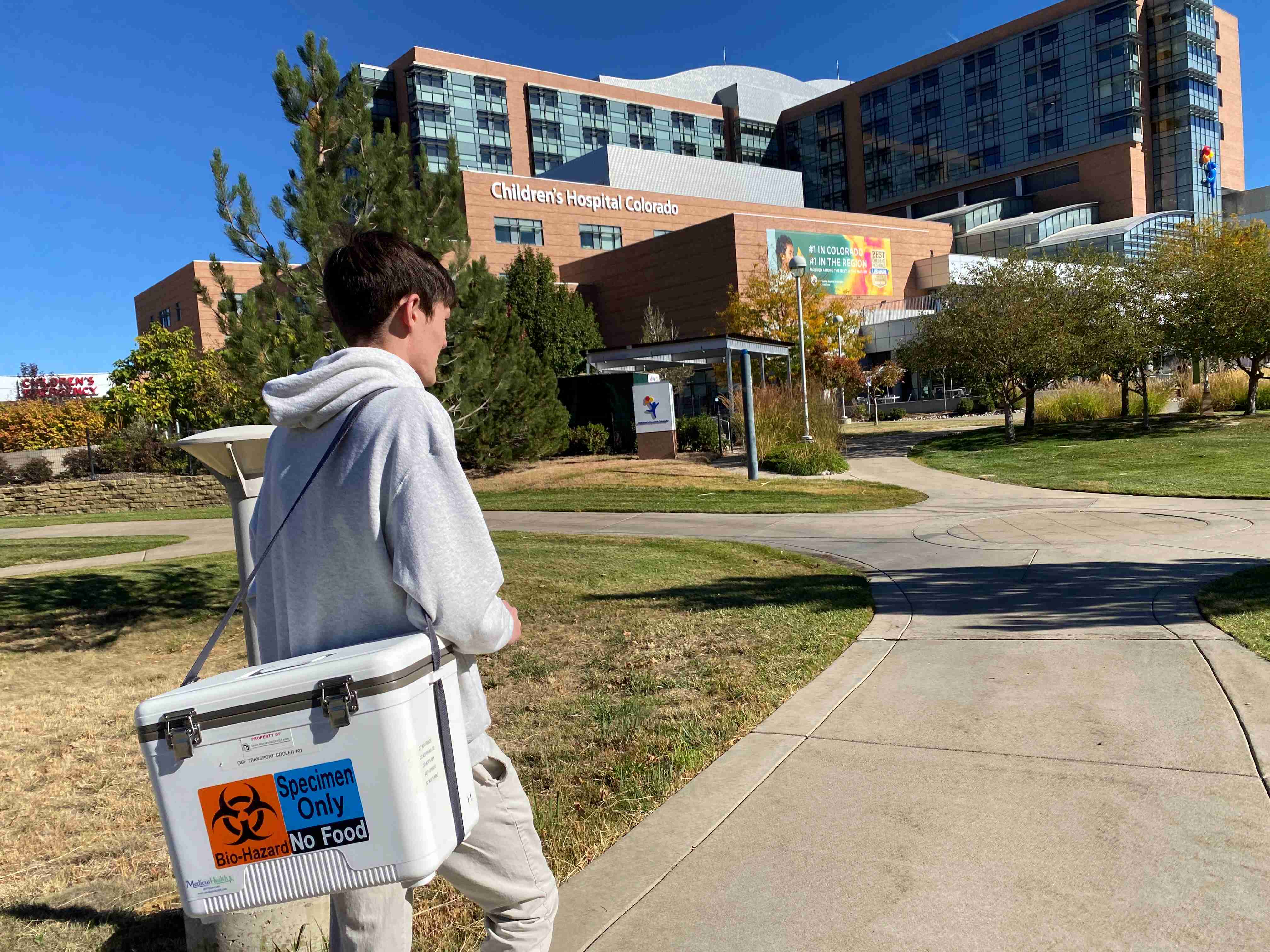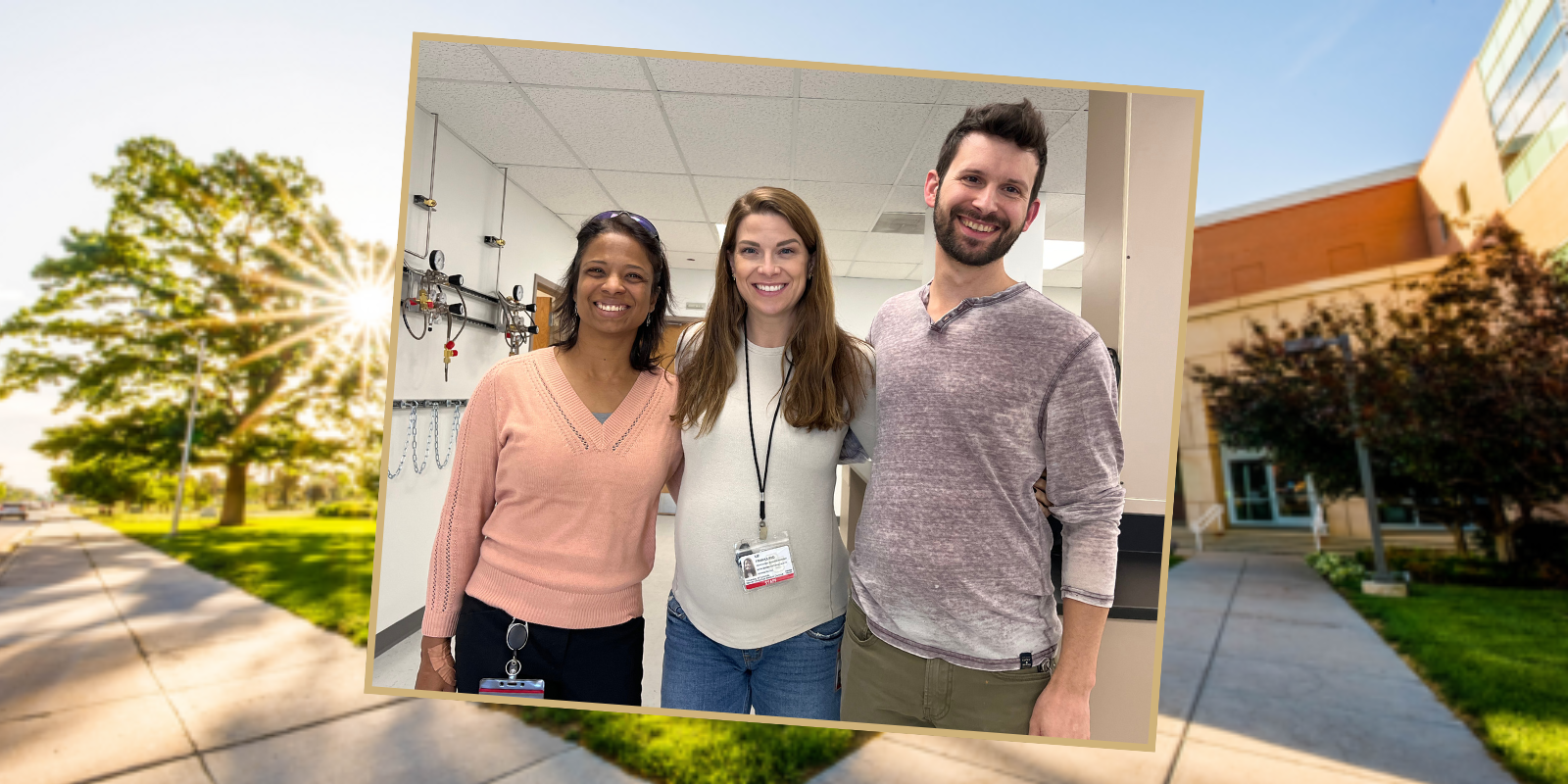A new phase 1 study of a chimeric antigen receptor (CAR) T-cell therapy at Children’s Hospital Colorado for pediatric patients with relapsed or refractory pre B-cell acute lymphoblastic leukemia (B-ALL) recently enrolled its first patient. The trial is the latest launched through Gates Institute, and is the fifth for which the Gates Biomanufacturing Facility produces the CAR T-cell product for research at the University of Colorado Anschutz Medical Campus.
B-ALL is the most common malignancy seen in children, says principal investigator (PI) Vanessa Fabrizio, MD, MS, assistant professor of pediatric hematology/oncology and bone marrow transplantation in the CU Anschutz School of Medicine. While B-ALL patient outcomes are generally positive, that is not the case for the subset of patients who relapse. The first patient enrolled in the trial is a young adult who had relapsed several times after starting treatment for the disease as a teenager. (Patients from 3 months to 30 years of age are eligible for the trial.) He received the treatment in late October and has so far tolerated the treatment with the new CAR T cell well, says Fabrizio, who is a member of Gates Institute and the CU Cancer Center.
Packaging two CARs in one
Since the first CAR T-cell treatment for pre B-ALL was approved by the FDA in 2017, it has shown remarkable success as a treatment in patients with multiple relapsed and refractory pre B-ALL, with over three-quarters of patients experiencing remission. However, about half of these patients eventually relapse, and this trial will help researchers explore a new variation of the novel therapy.
The CAR T cell now being tested is called CD19x22, so named because it targets two proteins, CD19 and CD22, which are frequently found on a specific leukemia cell surface. The technology was initially developed over the course of 2016-2018 by Gates Institute Executive Director Terry Fry, MD, during his tenure as an investigator with the Pediatric Oncology Group at the National Cancer Institute (NCI).

Terry Fry, MD, executive director of Gates Institute, with a young cancer patient during his time as an investigator in the Pediatric Oncology Group at the National Cancer Institute (NCI). Photo courtesy of NCI. |
Fry, who worked on some of the earliest CAR-T clinical trials at the NCI, likes to illustrate the iterations of CAR technology using a white board.
“Initially, we built a CAR that targeted the CD19 receptor, but about half of patients who had achieved remission eventually relapsed, and we found the leukemia had lost the CD19 protein,” he says, drawing a cell with a small receptor on the surface, then crossing it out. “When we developed a CAR that targeted CD22, the same thing happened.”
Although the Fry laboratory had previously engineered CAR T cells that target both CD19 and CD22 using a single CAR, they found it wasn’t as effective at targeting both using two separate CARs introduced in the same T cell. Fry surmised it was due to the architecture of the CAR T cell, drawing a cell with CD19 and CD22 binding domains linked on the cell surface like a tail on a kite. Fry went back to the drawing board, so to speak, devising a CAR T cell that placed the targets in separate places on the cell surface. This CAR T-cell is also currently being used in a clinical trial at UCHealth University of Colorado Hospital for adults with B-cell lymphomas – the first patients in the world to receive the dual-antigen CD19x22 T cells in this new format. Results from that trial will be reported by PI Manali Kamdar, MD, at an upcoming American Society of Hematology meeting.
Gates Institute provides expertise for groundbreaking research
Patients undergoing CAR T-cell therapy at CU Anschutz begin by having their blood drawn in a process called apheresis. Their T cells are isolated from other components of their blood and sent to the Gates Biomanufacturing Facility (GBF) where they are engineered to recognize cancer cells. These engineered T cells multiply over the course of several days before being injected back into the patient’s body, where they continue to multiply and attack cancer cells.
The complexity of a CAR-T clinical trial requires specialty expertise. The Gates Institute houses a team of cell and gene therapy clinical trial experts who support the development and design of the clinical trial through scientific writing, project management, and development of regulatory strategy and communications with the FDA. The team also supports the execution of the clinical trial once open by overseeing patient safety and supporting trial operations. Coupled with the biomanufacturing by the GBF, a pillar of Gates Institute, the Gates Institute has led the charge in getting this groundbreaking trial open for enrollment.
The FDA requires the CAR T cells be created in a Good Manufacturing Practice (GMP)-compliant facility. The GBF is the only GMP facility at an academic medical campus equipped to produce CAR T cells in the Rocky Mountain region. Before the GBF had opened its doors, research like this would have required sending cells across the country for the biomanufacturing process.
Customized treatments offer new approach to cancer therapy
CAR T-cell therapy is considered a form of immunotherapy because it leverages the immune system to fight disease by targeting specific antigens on cancer cells. In contrast, chemotherapy kills both cancer cells and healthy cells indiscriminately. CAR T-cell therapy is an autologous treatment, meaning the product is manufactured from cells provided by the patient. Fabrizio plans to infuse 21 patients over a 36-month period. This phase I study will determine the optimal dose of CAR T cells. The patients receive one infusion of CAR T cells and are then followed for the next 12 months to monitor for safety and side effects. Because it’s a “living drug,” patients continue to be followed for 15 years per FDA requirements to monitor for safety and side effects.
The treatment can cause severe side effects; for example, when T cells multiply in the patient, it can induce an inflammatory reaction by releasing too many cytokines causing cytokine release syndrome (CRS). This can cause high fevers, requiring oxygen support, and/or blood pressure support.
Fabrizio, who began her career when CAR therapies were just beginning to receive FDA approval, was drawn to conduct clinical trials to offer more choices to patients who have few options. It’s an investigator-initiated trial with the CAR T cells being manufactured at the GBF, which presents the opportunity to put CU Anschutz on the map in the cell therapy world, she says.
“This is an opportunity to really push medicine forward,” she says. “We are finding better ways to treat patients with therapies that weren’t available 20 years ago."
“A lot of that starts with bench research, but clinical trials are what inform the future and how we are going to integrate these therapies into patient care.”
Top photo: A staff member of the Gates Biomanufacturing Facility delivers engineered white blood cells to a patient waiting at the Children's Hospital Colorado for a clinical trial treating patients with chimeric antigen receptor (CAR) T cells.

.png)

-2.png)

%20for%20children%20and%20young%20adults%20with%20relapsed%20or%20refractory%20solid%20tumors.%E2%80%9D%20(1)-1.png)